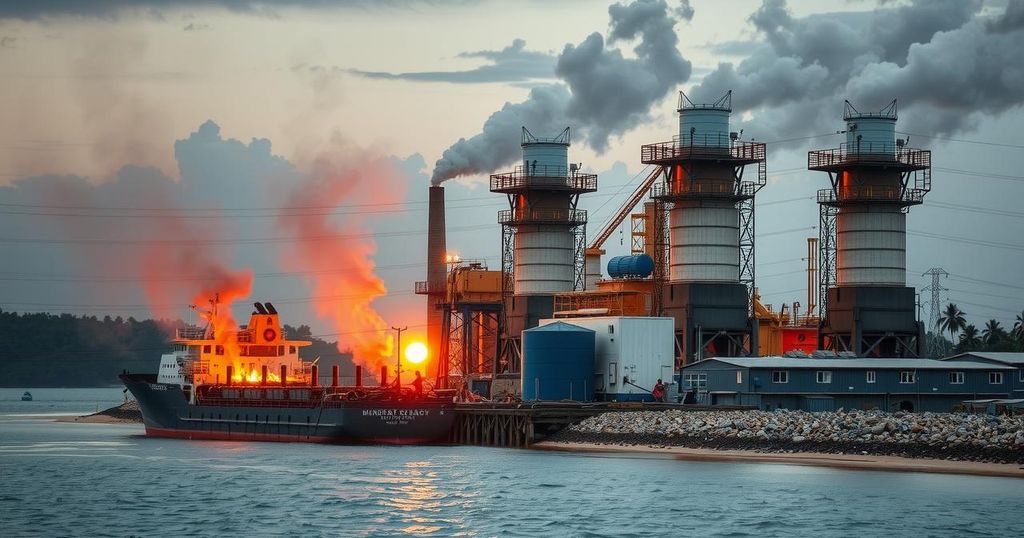Post-Election Unrest in Mozambique Leads to Power Plant Shutdowns and Increased Tensions

Following the controversial October elections in Mozambique, protests have paralyzed two power plants, causing a significant energy supply shortfall. The ruling Frelimo party’s claimed electoral victory has been vehemently disputed by opposition figures, leading to widespread civil unrest and numerous casualties. The situation is further complicated by intermittent border closures with South Africa and heightened tensions in various districts of the capital, Maputo.
Recent protests in Mozambique have resulted in the shutdown of two power plants, according to the national utility company, Electricidade de Moçambique. The unrest follows the announcement that the ruling Frelimo party, which has held power since 1975, won the October 9 elections, a claim that has been met with allegations of fraud from the opposition. Demonstrators targeted the Ressano Garcia and Gigawatt thermoelectric plants, demanding a halt to energy production, prompting Electricidade de Moçambique to cease operations at these facilities due to concerns over escalating protests.
The closure of these plants has led to a significant reduction in energy supply, with a reported shortfall of 30 percent in electricity demand for the southern region of Mozambique, which is home to approximately six million residents. Disruptions to traffic around the power plants have been noted, as visual evidence shared on social media highlights the chaotic situation.
Additionally, border management has been impacted, with South Africa’s Border Management Authority confirming intermittent closures in response to guidelines from the Mozambican government. Restrictions in the capital city of Maputo have varied significantly across different districts, further complicating the situation.
The protests have intensified following allegations from opposition candidate Venancio Mondlane of an assassination attempt, occurring just a month after a prior claim of similar nature. Following his challenge to the election results, Mr. Mondlane has reportedly sought refuge in South Africa, and his current location remains undisclosed.
Mr. Mondlane’s supporters have mobilized in protest after he contested the official election results, claiming he received 53 percent of the vote, significantly higher than the electoral commission’s assertion of nearly 71 percent for Frelimo’s Daniel Chapo, who is aimed at succeeding current President Filipe Nyusi. The Constitutional Council of Mozambique is expected to confirm election results before the inauguration scheduled for January.
International observers have flagged various irregularities during the electoral process, and reports indicate at least 90 fatalities occurring amid the ongoing clashes between protesters and security forces, revealing a deeply divided political landscape within the nation.
Mozambique, a southern African nation, is currently experiencing heightened political tensions following the recent elections held on October 9, in which the ruling Frelimo party was declared the winner. This announcement has been met with severe backlash from the opposition, who have characterized the electoral results as fraudulent. The situation has escalated into widespread protests and civil unrest, affecting vital infrastructure such as energy production plants and inciting significant public discontent. Observers have noted a troubling pattern of violence and political repression in the aftermath of the polls, culminating in tragic losses of life amid confrontations between demonstrators and law enforcement. The context surrounding the elections is crucial to understanding the reactions portrayed in the protests, as opposition candidates and their supporters challenge the legitimacy of the electoral outcomes, leading to broader conversations about governance, democratic integrity, and citizen rights in Mozambique.
In conclusion, the post-election period in Mozambique has been marred by significant unrest, leading to the shutdown of critical energy infrastructure and an alarming rise in violence. The allegations of electoral fraud and the contested political domination of the Frelimo party serve to highlight deep-seated issues within Mozambique’s democratic processes. As the nation navigates these challenges, the implications for governance, political stability, and civil rights remain critical areas of concern for both domestic and international observers.
Original Source: www.barrons.com








